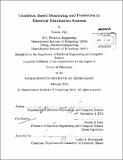Condition based monitoring and protection in electrical distribution systems
Author(s)
Orji, Uzoma A
DownloadFull printable version (40.25Mb)
Other Contributors
Massachusetts Institute of Technology. Department of Electrical Engineering and Computer Science.
Advisor
Steven B. Leeb.
Terms of use
Metadata
Show full item recordAbstract
The U.S. Department of Energy has identified "sensing and measurement" as one of the "five fundamental technologies" essential for driving the creation of a "Smart Grid". Consumers will need "simple, accessible..., rich, useful information" to help manage their electrical consumption without interference in their lives. There is a need for flexible, inexpensive metering technologies that can be deployed in many different monitoring scenarios. Individual loads may be expected to compute information about their power consumption. New utility meters will need to communicate bidirectionally, and may need to compute parameters of power flow not commonly assessed by most current meters. These meters may be called upon to perform not only energy score-keeping, but also assist with condition-based maintenance. They may potentially serve as part of the utility protection gear. And they may be called upon to operate in new environments, e.g., non-radial distribution systems as might be found on microgrids or warships. This thesis makes contributions in three areas of condition-based maintenance and protection in electric distribution systems. First, this thesis presents a diagnostic tool for tracking non-integer harmonics on the utility. The tool employs a modified algorithm to enhance the capability of the Fast Fourier Transform (FFT) to determine the precise frequency of a newly detected harmonic. The efficacy of the tool is demonstrated with field applications detecting principal slot harmonics for speed estimation and diagnostics. Second, data from nonintrusive monitors have been shown to be valuable for power systems design. This thesis presents a new behavioral modeling framework developed for microgrid-style shipboard power system design using power observations from the ship's electrical distribution service. Metering can be used to inform new designs or update maintenance parameters on existing ship power systems. Finally, nonintrusive metering allows for new possibilities for adaptive fault protection. Adaptive thresholding of voltage magnitude, angle and harmonic content will be demonstrated for improving protection schemes currently used in ship electrical distribution systems.
Description
Thesis: Ph. D., Massachusetts Institute of Technology, Department of Electrical Engineering and Computer Science, 2014. Cataloged from PDF version of thesis. Includes bibliographical references (pages 354-362).
Date issued
2014Department
Massachusetts Institute of Technology. Department of Electrical Engineering and Computer SciencePublisher
Massachusetts Institute of Technology
Keywords
Electrical Engineering and Computer Science.